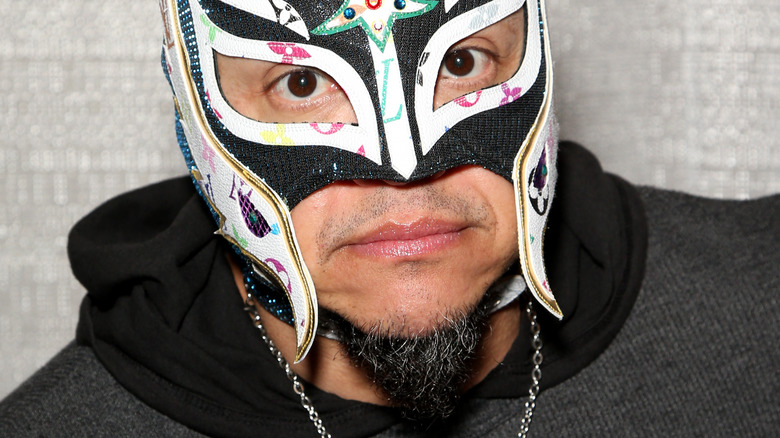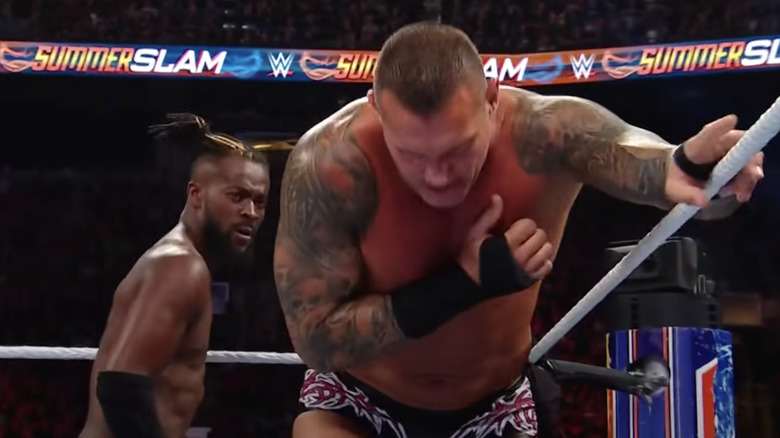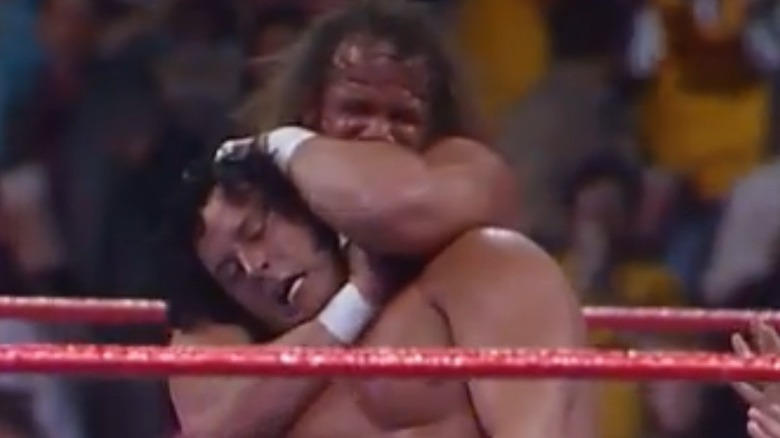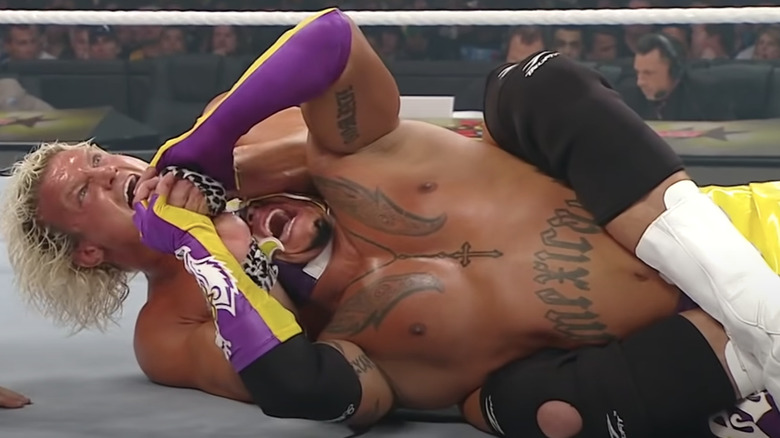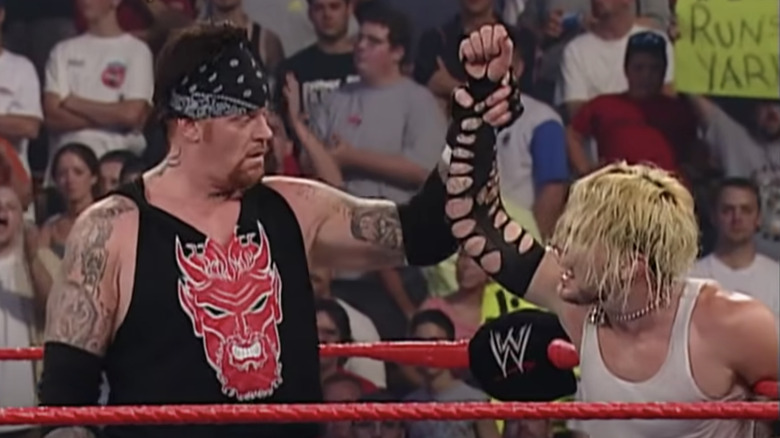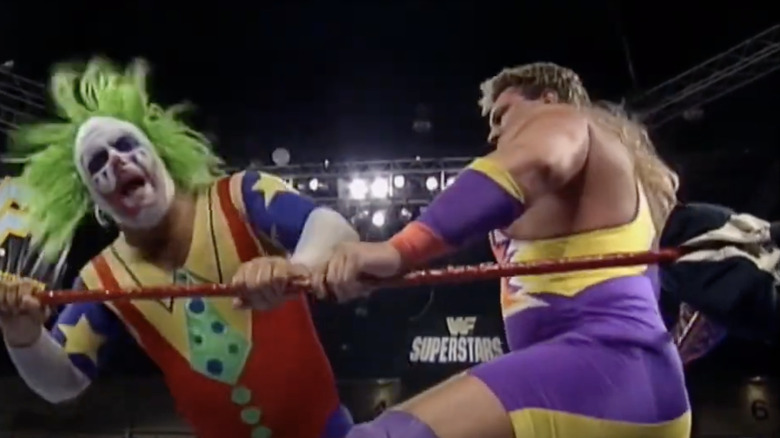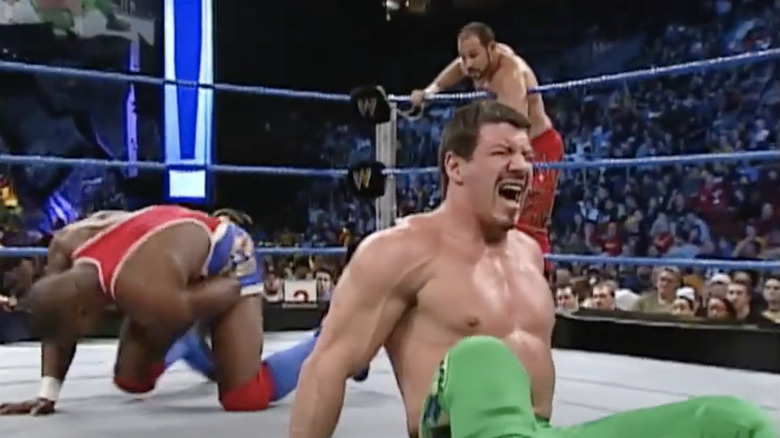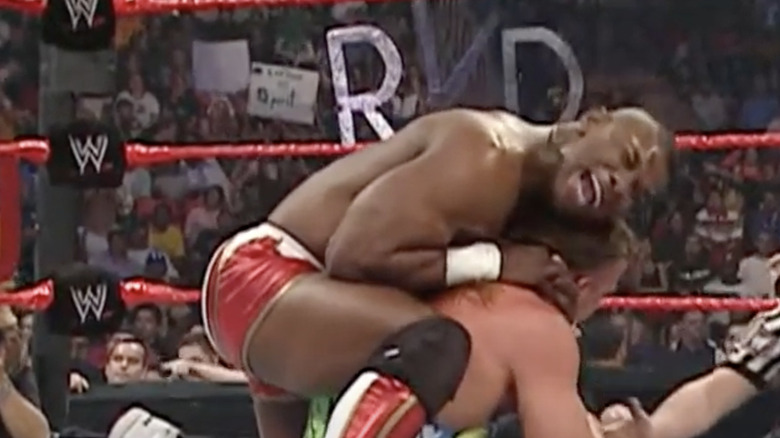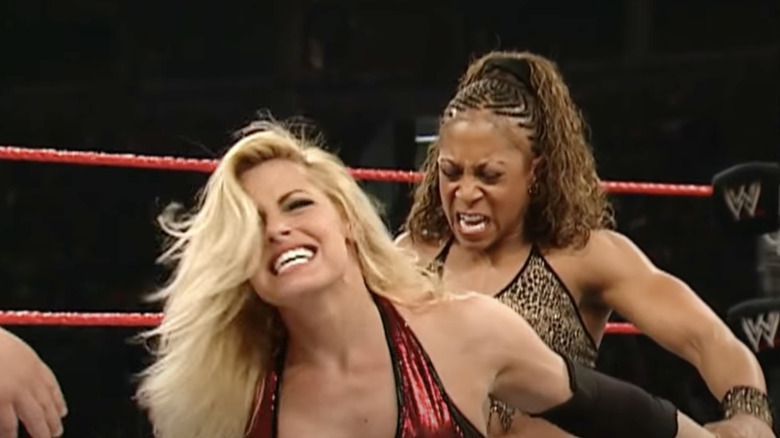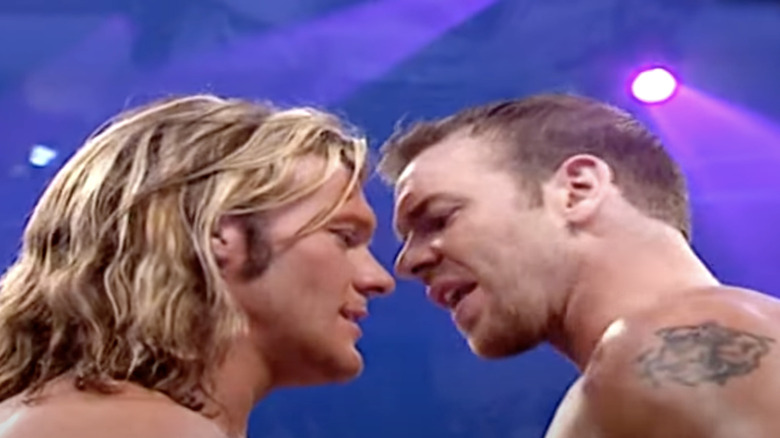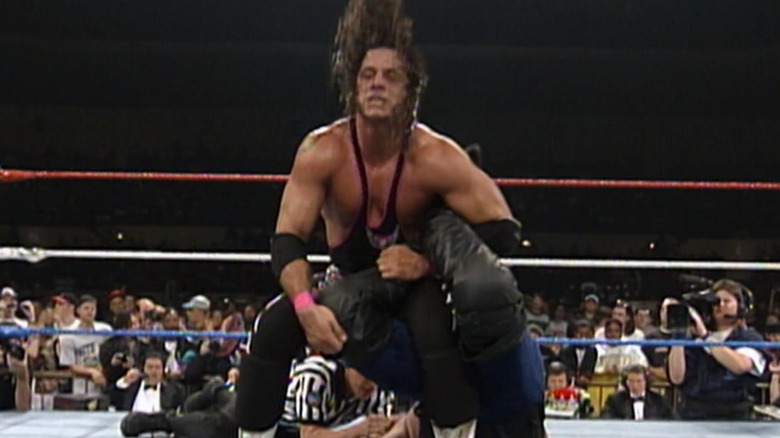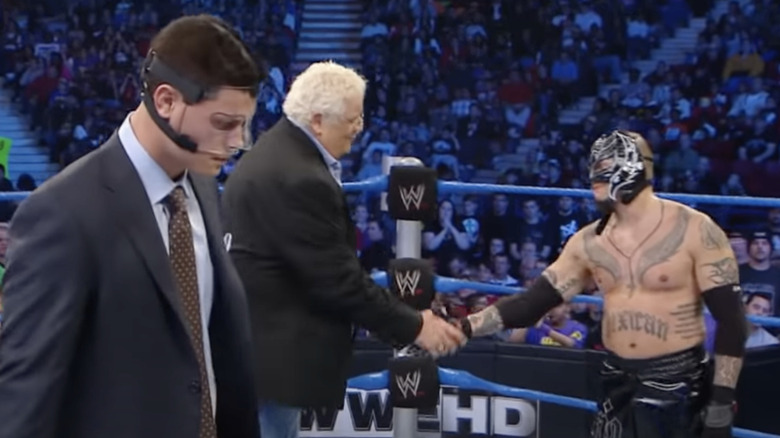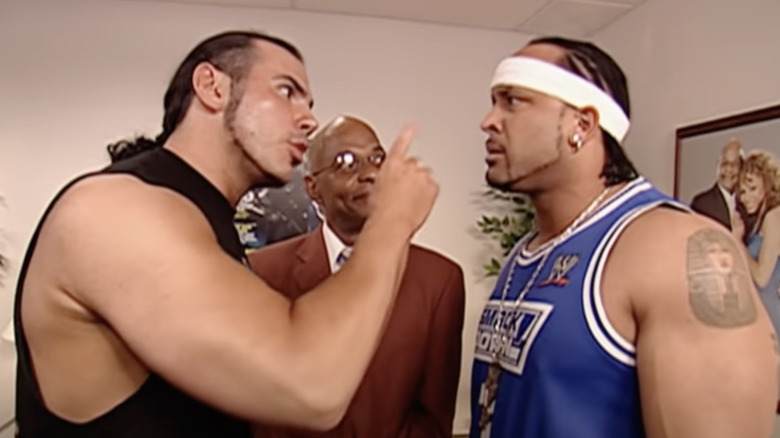Underrated WWE Feuds That Added Excitement To The Promotion
We may receive a commission on purchases made from links.
When it comes to the greatest professional wrestling cards of all time, depth is the factor that separates the good shows from the all-time great shows. For a long time, depth of card made WWE a compelling watch for wrestling fans, especially after the acquisition of WCW and all its properties.
The installation of Paul Levesque (Triple H) as chief content officer has once again allowed midcard storylines to flourish with characters developing from week-to-week as opposed to simply being shoe-horned into repetitive matches against one another. However, WWE has a long and storied history of creating fascinating storylines that not only highlight the talent around a card, but can elevate them in the right scenario — some of which are not as well remembered as they should be.
Here are 12 underrated WWE feuds that added excitement to the promotion.
Randy Orton vs. Kofi Kingston
There are two small feuds that make up the storyline between Randy Orton and Kofi Kingston. The first came about two years after Kingston's debut, when he found himself in the crosshairs of Orton and his faction, The Legacy. Kingston got to show a different, more aggressive side to his personality against Orton, a cold, callous fighter befitting of his new nickname, "The Viper." After weeks of bullying from Orton and his cronies, Kingston stood up for himself by destroying Orton in front of a packed crowd at Madison Square Garden in November 2009, putting his aggressive side on full display. Months later, the two came into each other's orbit once again, with Kingston this time responding to Orton's aggression by defacing a stock car gifted to Orton by his Legacy underlings, Ted DiBiase Jr. and Cody Rhodes.
From there, the Kingston-Orton feud was seemingly put on an elongated pause, with Kingston having to prove himself time and time again while Orton remained at the top of the card. Nearly a decade later, Kingston got his WrestleMania moment when he defeated "The New" Daniel Bryan for the WWE Championship at WrestleMania 35 in 2019. As champion, Kingston eventually came face to face with an old foe in Orton. Prior to their match at SummerSlam that year, the two interacted on the microphone for the first time in a long time. Kingston finally beat Orton in the ring at SummerSlam, bringing a 10-year-long arc full circle while showing how an old feud can be properly revisited no matter how much time has passed.
Randy Savage vs. The Honky Tonk Man
The long feud between Randy "Macho Man" Savage and The Honky Tonk Man is historically significant because of how it helped solidify the legendary status of both wrestlers. For Savage, his feud with The Honky Tonk Man bridged off into a lengthy program with Hulk Hogan over the creation and implosion of The Mega Powers. The Honky Tonk Man, meanwhile, found a great foil in Savage that helped prop up what would become the longest Intercontinental Championship reign in company history, and one of the most famous title reigns of all time.
The matches between Savage and The Honky Tonk Man ranged from very good to subpar, but perhaps the most memorable of these matches is so for the post-match angle rather than the match itself. The Intercontinental Champion enlisted the help of The Hart Foundation during an episode of "Saturday Night's Main Event." Bret Hart and Jim Neidhart stormed the ring during the match, subduing Savage afterwards so The Honky Tonk Man could wrap a guitar around the "Macho Man's" head. However, Savage's valet, Miss Elizabeth, retrieved Hulk Hogan from the back, who proceeded to make the save and shake Savage's hand, kicking off the Mega Powers storyline.
According to Cagematch, Randy Savage and The Honky Tonk Man stood across from one another 93 times between 1986 and 1990. The early matches between the two saw the Honky Tonk Man take on the role of babyface while Savage reigned as the arrogant heel Intercontinental Champion. Their alignment flipped once Honky Tonk Man began cutting more biting promos and turned his attention to Miss Elizabeth. As characters, The Honky Tonk Man and the "Macho Man" had tremendous chemistry that came across best in their promos in a pre-episodic television wrestling era. The two rivals met again during an episode of "The Main Event" in 1988 under similar circumstances and produced a quality match.
The longevity of the rivalry, combined with The Honky Tonk Man's willingness to push Savage's buttons, make this one of the most underrated WWF feuds of the '80s.
Rey Mysterio vs. Dolph Ziggler
One could probably make a case for several Rey Mysterio feuds being underrated in the grand scope of the WWE. His feud with Dolph Ziggler is unique in that it gave Ziggler enough credibility to propel the character to a 14-plus year career in WWE. When the WWE repackaged Nic Nemeth as Dolph Ziggler in late 2008, he initially debuted as a cheesy comedy heel who had an unorthodox name, generic entrance music and a habit of introducing himself to everyone he came in contact with. However, the Ziggler character quickly showed he could hold his own bell-to-bell and hit a new gear during his feud with Mysterio. Ziggler first attacked Mysterio unprovoked following a defense of his Intercontinental Championship, and later agreed to meet at Night of Champions 2009 following a verbal confrontation.
The feud seemed basic enough by nature, but Ziggler and Mysterio proceeded to have a very good match at Night of Champions in Philadelphia. The match painted a picture of two men vying for a prize and willing to do anything within their means to obtain it, all while showcasing the athleticism of an otherwise unproven Ziggler. Mysterio and Ziggler followed their first title match up with an even better sequel at SummerSlam 2009, one that stole the show. The desperation shown by Ziggler legitimized him throughout the contest, a more enhanced take on the typical rookie vs. veteran type of match. While Ziggler came away empty-handed, the story he managed to tell in the ring with Mysterio led to further storyline opportunities before finally winning the title in summer 2010. Without his 2009 encounters with Mysterio, it is difficult to know how much longevity Dolph Ziggler would have had competing for WWE.
Undertaker vs. Jeff Hardy
Wrestlers who reach the rarified status of The Undertaker rarely get to work meaningful programs with wrestlers down the card, but when they do, it usually makes for fascinating theater. The Undertaker had a brief, albeit meaningful, spell with Jeff Hardy back in 2002 that ultimately led to him turning face and Hardy breaking out on his own as a singles star. On one hand, The Undertaker had long established himself as a bully inside the ring who knew few competitive equals. On the other, Hardy's high-risk style signified a willingness to go to whatever extreme it took to get his hand raised. In the weeks leading into the famed "Monday Night Raw" match, Hardy, frustrated over he and his brother losing sight of their ability to "live in the moment," provoked The Undertaker during a match with Tommy Dreamer, putting him directly in the crosshairs of "The Deadman" in the weeks to follow.
The famed ladder match occurred on July 1, 2002, with The Undertaker's Undisputed Championship on the line. The tagline around the match stemmed from a promo in which The Undertaker expressed his desire to make Hardy "famous," which ultimately led to Jim Ross' legendary call towards the end of the match. Hardy took "The Deadman's" greatest hits throughout the match, but his willingness to keep coming forward made him a bona fide star in the long run and earned him the respect of his legendary opponent. "The whole story of the underdog versus the man and the legend, but he couldn't keep the underdog down no matter what he did to me and then the sign of respect at the end and me collapsing as 'Raw' goes off the air with me looking at my hand like 'did that really just happen?' It was a miracle," Hardy told talkSPORT. "Yeah, everyone was very pleased. I don't know if we got the standing ovation, I think we might have, but everyone was very pleased with the match and it was very deserving."
Doink the Clown vs. Crush
When the WWF made the bold decision to turn Matt Borne into an evil clown, the character needed a solid, believable adversary to play off. Enter Crush, a physically dominant babyface wrestler who was in the process of finding his own way in the company at the time. Doink the Clown became known for playing heinous pranks on both fellow wrestlers and young fans. When Crush confronted Doink, the clown struck the big man with a loaded prosthetic arm, putting him out of action through the 1993 Royal Rumble. As a result, Crush sought revenge and the two vastly different characters agreed to settle their differences at WrestleMania IX in Doink the Clown's first WWF pay-per-view match.
Fans looking to see Crush exact a measure of revenge on the evil clown were left disappointed as the Hawaiian fell victim to more of Doink's in-ring antics. As Crush looked to finish the match, a referee bump paved the way for a second Doink (played by Steve Keirn) to jump in the ring and incapacitate Crush with the same prosthetic limb that put him out of action. "I think when you go back and look at all-time great finishes that people remember, they remember the twin referees from The Main Event, and I think they remember the double Doinks," former WWE Bruce Prichard executive said on his podcast. "It was probably too well done in that people appreciated the cleverness of the evil clown, Doink –- what's to hate about that? It was a great finish and very well done."
Los Guerreros vs. Team Angle
The story of Eddie Guerrero's recovery from addiction, as well as the incredible singles run he had later in his career, tends to sometimes overshadow the run he had with his nephew, Chavo, as "Los Guerreros." The Guerreros found themselves among the top tag teams in the company at a time when tag team wrestling in the WWE had never been better. Their greatest opponents and threats to the WWE Tag Team Championship may have been Team Angle, also known as the World's Greatest Tag Team. Charlie Haas and Shelton Benjamin, two disciples of Kurt Angle, had the athleticism and chemistry with one another to hang with any tag team, while the Guerreros, bonded by blood and the Guerrero family style, fit a similar mold. As a result, these two teams made for natural opponents, wrestling each other in 35 out of Los Guerrero's 101 matches together between 2002 and 2005.
Many of the matches the two teams went on to have together saw both sides enter the match as heels. Los Guerreros routinely cheated to win their matches, but the manner in which they did it — combined with the irredeemable nature of their opponents due to their association with Kurt Angle — turned Eddie and Chavo babyface. "In the beginning, the cheers confused the s*** out of me," Eddie Guerrero wrote in his book, "Cheating Death, Stealing Life: The Eddie Guerrero Story." "Then I remembered something my dad used to say. 'Son,' he'd tell me, 'it doesn't matter if it's good news or bad news, as long as they spell your name right.'" Los Guerreros went on to trade wins with Team Angle throughout 2003, with perhaps their best occurring during a September 18, 2003 episode of "Smackdown." Eddie Guerrero went on to win the WWE Championship the following year while Benjamin parlayed his year-long run teaming with Haas into a significant singles push in the years to follow.
Shelton Benjamin vs. Rob Van Dam
Shelton Benjamin's singles push led him to a post-WrestleMania 22 program with Rob Van Dam, the second-ever holder of the Money in the Bank Briefcase. Benjamin, the Intercontinental Champion, appeared alongside Van Dam in the second-annual Money in the Bank Ladder Match, and began to agitate RVD in the weeks to follow with the intention of challenging him for his Money in the Bank briefcase. Van Dam agreed to Benjamin's proposal, provided he put his Intercontinental Championship on the line first. Instead, Benjamin entered a match against a mystery opponent the following week on "Raw" with a big stipulation: If he won, RVD's briefcase would be on the line at Backlash, while if he lost, his Intercontinental Championship would be on the line. The mystery opponent turned out to be Benjamin's former tag team partner Charlie Haas, who beat him with a jackknife roll-up after Benjamin attempted to taunt RVD.
Desperate, Benjamin begged Mr. McMahon to make things right. As a result, Van Dam had the same stipulation imposed on him, though instead of a mystery opponent, he had to defeat The Spirit Squad in a five-on-one handicap match. With Van Dam falling victim to superior numbers, his impending match with Benjamin became winner-take-all, an epic first that saw the Intercontinental Championship and Money in the Bank Briefcase be put up for grabs in the same match. Van Dam ended up defeating Benjamin in just under 19 minutes of hard-hitting, hyper-athletic fare befitting of the skills and abilities of both wrestlers. The only downside to the month-long program between Van Dam and Benjamin is that it did not last longer, as the two made for natural adversaries between the ropes.
Trish Stratus vs. Jazz
Trish Stratus embodied everything positive about the women's division in the mid-'00s. Her feuds with Lita, Victoria, and Mickie James not only carried the division during these years, but inspired the current generation of women's wrestlers that have since reached seismic levels of popularity. However, Stratus' feud with Jazz often goes overlooked when juxtaposed next to her other programs. Stratus' finesse-based style meshed well with Jazz' power in the ring, and both women constantly wrestled each other as if they had something to prove. "During that time, the girls, they were so tired of those gimmick matches: the panty and bra matches, and pillow fights and all that s***. They were sick of that," Jazz told John Poz of Hannibal TV. "We wanted to show the world that we could wrestle. We wanted our time and we just wanted to show not only the WWE people but all the fans that we belong and we deserve our time on the show."
Given the lack of time women had to tell compelling stories during the "Ruthless Aggression Era," Stratus and Jazz told the story of their rivalry almost entirely in the ring. The two wrestled one another primarily between 2002 and 2003, but their in-ring rivalry reached its highest point at WrestleMania XIX when Jazz defended her WWE Women's Championship against the likes of Stratus and Victoria, another woman who never shied away from physicality. The match proved to be a solid showcase for the women's division, coming in at just under 10 minutes on one of the greatest WrestleMania cards of all time.
Chris Jericho vs. Christian
When Trish Stratus wasn't competing for women's titles, she often got involved in storylines with the men. One of her most notable intergender programs put her between former friends turned enemies in Chris Jericho and Christian. The Canadian wrestlers had been teaming together as "Vitamin-C" with Christian serving Jericho, the first-ever undisputed champion, in a lackey-type role. In late 2003, the duo sparked a romance angle with frenemies Stratus and Lita after Christian used a favor he earned with General Manager Eric Bischoff to allow Lita to keep her job. The romance seemed to be all for naught, however, with Jericho and Christian being revealed to have bet "one Canadian dollar" over who could sleep with their respective Diva first. Through spending time with one another on and off screen, Jericho gained legitimate feelings for Stratus and sought to win her back even after all had been revealed. Christian, however, thought differently, and continued to torment Stratus out of jealousy over her relationship with his tag team partner.
The two met for the first time in the ring at WrestleMania XX at Madison Square Garden. The Canadian superstars delivered a fundamentally sound match on the big stage, though the finish and post-match theatrics likely overshadowed the match itself. In a shocking twist, Stratus turned on Jericho, slapping him, and ultimately paving the way for Christian to pick up perhaps the biggest singles win of his career up to that point. Christian and Stratus then proceeded to make out on the entrance ramp while Jericho's facial expressions sold the likely emotions of fans watching around the world. Y2J would, however, exact proper revenge at Backlash 2004 when he beat Christian and Stratus in a handicap match.
Bret Hart vs. Hakushi and Jean-Pierre Lafitte
Out of all the feuds and opponents Bret Hart had in his epic 13-year career in the WWF, his feud with Hakushi and Jean-Pierre Lafitte might be most representative of his greatness. With Vince McMahon seemingly intent on looking elsewhere to fill the void left by Hulk Hogan after his departure to WCW in 1994, the company tasked Hart with a series of midcard programs in 1995. Few were more compelling than his feud with Hakushi, which would be eventually transferred to Jean-Pierre Lafitte, a short-lived pirate character played by former Quebecer Pierre Carl Oulette. Hakushi, perhaps better known as current Michinoku Pro Wrestling President Jinsei Shinzaki, first appeared in 1994 as Hakushi, a mysterious tattooed warrior from Japan. After matches against the likes of Matt Hardy, Aldo Montoya and the 1-2-3 Kid, Hakushi turned his attention to Hart. With the versatile Hart able to handle the junior heavyweight pace of Hakushi, the two made for great opponents.
The marquee match between Hart and Hakushi occurred at the inaugural In Your House pay-per-view in 1995. In the subsequent weeks, Hakushi began carrying around a severed head resembling The Hitman only for the head to be stolen by LaFitte. LaFitte also stole replica versions of Hart's signature glasses from fans at ringside as well as the Hitman's ring jacket as part of a creative setup to their eventual match. While Hart himself called the jacket angle with Lafitte "lame," the two put forth a show-stealing classic against one another at In Your House 3, with Hart able to effectively sell LaFitte's offense while matching the pirate's physicality. Hart's connected storyline with Haksushi and LaFitte must have left an impression on McMahon, as the Hitman won his third WWE Championship less than two months after In Your House 3.
Rey Mysterio vs. Cody Rhodes
Prior to his departure from the WWE in 2015, Rey Mysterio proved his worth to the company through a series of impressive matches and feuds that cemented his place among all-time WWE babyfaces. While his feuds with Chris Jericho and CM Punk are often seen as high points, his program with Cody Rhodes is often overlooked by fans. Mysterio legitimately broke Rhodes' nose during a match, transforming "Dashing" Cody Rhodes to "Undashing" in an instant. Disgusted with his "deformity," Rhodes began wearing a clear protective mask in segments and matches to both protect his nose from further harm and use as a weapon against his enemies.
Rhodes made his return to "SmackDown" with his father, Dusty Rhodes, in tow. While the segment initially began with the elder Rhodes asking his son to apologize to Mysterio, "The American Dream" ended up siding with his son in a beatdown of Mysterio. The segment ended with Cody removing Mysterio's mask as father and son celebrated. Rhodes and Mysterio went on to have one of the best matches at WrestleMania 27 and continued their feud in the months to follow, but according to Rhodes, the WrestleMania match might not have happened had Mysterio not barged into Vince McMahon's office to make the match so. "Without Rey doing that, nothing happens," Rhodes said in a Q&A with Inside the Ropes. "I don't know why Rey took such a trust in the whole situation."
Matt Hardy vs. MVP
One of the most innovative midcard feuds in WWE history also helped Matt Hardy find his place on "SmackDown." After returning to the WWE to feud with Edge and his ex-girlfriend Lita, Hardy moved to the "Blue Brand" and struggled to find his place on the card. A staph infection sidelined him for a month and he went on to reunite with his brother, Jeff, as the brand split began to soften. However, once the Hardy reunion tour ran its course, Matt Hardy still lacked direction as a singles competitor. This changed quickly once Hardy began feuding with Montel Vontavious Porter, also known as MVP. MVP's personality contrasted Hardy's in every way, and what started as a feud over MVP's United States Championship turned into a game of one-upmanship with MVP claiming to be better at Hardy in "everything."
Hardy and MVP went on to compete against one another in a variety of sports, lawn games, and challenges. As a result, the feud brought out the comedic side of both characters and led to some of the most irreverent content WWE has ever produced on its episodic television programs. The on-screen manifestation of the old Michael Jordan-Mia Hamm Gatorade commercials from the '90s led to a boxing match at the revived "Saturday Night's Main Event." However, with MVP being rendered unable to compete due to a rare diagnosis of Wolff-Parkinson-White heart syndrome, the company replaced him with none other than former heavyweight boxing champion Evander Holyfield, who proceeded to carry Hardy before ultimately knocking MVP out due to his interference. Hardy and MVP went on to have a beer drinking contest at SummerSlam that year and even held the WWE Tag Team Championship for a spell before Hardy finally bested MVP for the U.S. title at Backlash 2008.
